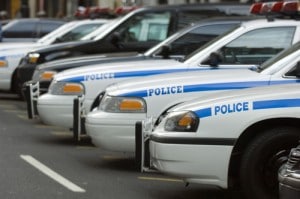Setting up a police station can feel like an overwhelming task — from the weapons your team will use, to the desks they will sit at to write reports. The list of items you need to get started is quite extensive. As you are preparing a new station, don’t forget these seven crucial storage and organizational items that every station needs. This article is part 2 of a three-part series to help modern law enforcement facilities get as organized as possible. Read part 1 here.
1. Cabinetry
Office supplies, printer paper, protective equipment, extra uniforms — the list of items in a police station is practically endless. Attractive cabinetry keeps those items off the floor and off desks to make the station organized and tidy, while still allowing for accessibility. When setting up a police station, cabinetry will be essential in nearly every room, from the office areas to the common rooms.
2. Weapons Storage
Weapons storage is crucial, as it will provide safekeeping when weapons are not in use. Storage needs to be both accessible and protected. Those in charge of designing the facility need to consider temporary weapons storage options for common areas and interview rooms as well as the main weapons storage area. Portable weapons storage is also a necessity.
3. Evidence Lockers and Storage
Evidence lockers provide a safe place to temporarily store evidence before the lab can evaluate it. These lockers need to be secure so no one can tamper with the evidence, but accessible so officers can quickly deposit evidence before filing reports or booking suspects.
Once the evidence has been logged and analyzed, it needs a safe place to be stored. A wide range of static shelving options can hold items such as clothing and used ammunition (for use in court), or for record-keeping purposes.
4. Filing Systems
Every arrest and case brings pages of paperwork. While the paperwork side of law enforcement is neither glamorous nor exciting, it is crucial to ensuring that people are treated properly when facing arrest. Because of the amount of paperwork involved with law enforcement, logical and secure systematic filing systems are necessary to ensure that the paperwork is handled properly once it is collected.
5. Mail Center
Mail is another crucial yet sometimes tedious part of running a station. A well-organized mail center allows this aspect of the station to be minimally stressful. When mail has a set place to go and a set group of people responsible for getting it there, the rest of the station can function smoothly. Sort modules and consoles can make setting up a mail center easy.
6. Personal Storage Areas
When officers are on the job, where are they going to stash their belongings? Personal storage areas are crucial to a well-run station. Lockers make the ideal personal storage area, as they provide officers with a secure place for clothing, purses, wallets and other personal items while they are on the clock.
7. Desks
Each officer in your station needs a place of his/her own. Modular casework can serve as an ideal desk setup for personal workstations. These can easily be adjusted when your needs change or your station grows, but they provide officers with a place to file paperwork, perform computer searches, book suspects and store personal or professional gear when not in the field.
As you make the plans for your facility, make sure you plan for adequate storage. With these seven items in hand, you will be well prepared.
Author Bio:
Denny Hammack is the President of Patterson Pope. Patterson Pope is the primary provider of storage solutions for businesses in the public safety industry.
- Music & Arts Grant Recipients – 2023 - December 1, 2023
- How to Tell When You Need New Brakes - November 20, 2023
- 20 Best Gratitude Quotes - November 16, 2023

